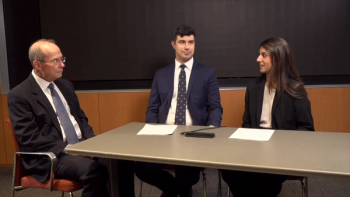
New sustained-release anti-VEGF formulation EYP-1901 proves safe, effective in phase 1 trials
Jay Duker, MD, discusses EYP-1901, EyePoint Pharmaceuticals’ sustained-release anti-VEGF drug for the treatment of wet AMD.
At AAO, Jay Duker, MD, sat down with the editors of Modern Retina to discuss EyePoint Pharmaceuticals’ pipeline product EYP-1901. As a sustained-release anti-VEGF, EYP-1901 has the potential to be a durable treatment option for wet AMD, possibly extending time between injections to six months.
EYP-1901 has completed phase 1 clinical trials for treatment of wet AMD. The biannual injection is vorolanib, a tyrosine kinase inhibitor, which is distributed by EyePoint Pharmaceuticals’ proprietary Durasert implant. The implant is bio-erodible and has a history of safety: four products have been FDA-approved for use with Durasert.
Video transcript
Jay Duker, MD: I'm going to talk about our new exciting pipeline product, EYP-1901. EYP-1901 is a sustained-release anti-VEGF, which has the potential to be an every six month injection for wet macular degeneration. EYP-1901 is vorolanib, which is a tyrosine kinase inhibitor which has activity against all the VEGF receptors. It is in our proprietary Durasert implant. The Durasert implant and the EYP-1901 is bio-erodible. We've had four FDA-approved products using Durasert, so there's a long history of safety for the product.
Vorolanib was tested previously in both a phase 1 and phase 2 trial in humans for wet macular degeneration as an oral preparation. And while it showed good efficacy signals in those investigations, unfortunately, it was toxic systemically. So by using it locally, we expect to get around the toxicity. And in fact, the phase 1 results which were recently presented at the AAO meeting by David Boyer showed that we had a very impressive safety profile.
In the 17 patients in the phase 1 trial, we had no ocular serious adverse events. We had no drug-related systemic adverse events. The adverse events that were reported were grade two or less in all cases, except one, which was not drug-related. So we feel that the safety profile looked very strong.
We also showed evidence of efficacy. All of these patients who were previously treated and previously treated wet AMD patients get most of their visual acuity improvement in the first three months. Since they all were enrolled four months or longer, we didn't expect any visual acuity improvements, but we hoped for stability. And in fact, that's what we found. With the 17 patients at the end of six months, the only change in visual acuity across the whole cohort was approximately minus two letters.
With respect to OCT, which is a measurement of VEGF activity, again, we expected stability in this previously treated group. And that's we found. At the end of six months, there was a small decrease in the retinal thickness on OCT of a very minimal amount, about two microns.
We also had what we feel is a very impressive rescue free rate, up to the four-month visit. 76% of the eyes did not require a rescue standard of care injection, and up to six months, 53% of eyes did not require a standard of care rescue injection. We also measured what we refer to as treatment burden. How many injections on average per month did the patients get prior to enrollment? And then for the six months, after how many injections standard of care did they require? We had what we feel as a very clinically significant decrease of a burden of the injections by 79% across the entire cohort.
So we're very excited by David Boyer’s presentation and we look forward to taking this product into multiple phase 2 trials in 2022.
Nancy Lurker: Just to add to Dr. Jay Duker’s comments, we’re obviously very pleased with the results of this study. And want to also just comment: for EyePoint Pharmaceuticals, it's really a major milestone forward.
Where we plan to be able to go into Phase 2 studies, as Dr. Duker mentioned, but in addition, we have other molecules that we believe can be used in Durasert to treat retinal eye diseases. And certainly the DAVIO [Durasert and Vorolanib in Ophthalmology] study really helped us cross a key hurdle in terms of proving that we could take these molecules forward and get a safe, and in this case, efficacious outcome in in a small Phase 1 study.
So we're very pleased with this, we've got big plans ahead for the company, and we're quite excited about the future. In addition, I want to add, we're thrilled to be able to potentially advance these treatments for patients as well.
Note: transcript has been lightly edited for clarity.
Newsletter
Don’t miss out—get Ophthalmology Times updates on the latest clinical advancements and expert interviews, straight to your inbox.





























